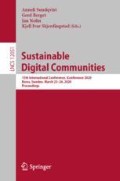Abstract
Using data collected through semi-structured interviews, this paper outlines two ways disabled people relate to their representation in archives. First, many participants reflected on the prevalence of disability stereotypes, tropes and limited perspectives within the records that document us. Witnessing these representations—or rather, misrepresentations—and their violent effects is emotionally difficult for many disabled people researching our histories. Second, many interviewees saw themselves in archival subjects and related to the threat of institutionalization they faced. Yet, as they see pieces of themselves in other times, disabilities and geographies, disabled researchers are also aware of the activation of present politics, vocabularies, and critical lenses that they apply when addressing the historical record. As part of a larger research project that investigates the impacts of archival representation, these findings lay the foundation for the multifaceted ways in which disabled communities are affected by witnessing themselves in history through digital and physical archives.
Access this chapter
Tax calculation will be finalised at checkout
Purchases are for personal use only
Notes
- 1.
The digital and physical archives interviewees worked with varied: some would be considered mainstream archives and special collections, while others identified disability-specific collections or framed themselves as a disability-centered archives.
References
Snorton, C.R.: Black on Both Sides: A Racial History of Trans Identity, 1st edn. University of Minnesota Press, Minneapolis (2017)
McMillan, U.: Embodied Avatars: Genealogies of Black Feminist Art and Performance. New York University Press, New York (2015)
Schweik, S.: The Ugly Laws: Disability in Public. New York University Press, New York (2010)
Imada, A.: Promiscuous Signification: leprosy Suspects in a Photographic Archive of Skin. Representations 138(1), 1–36 (2017)
White, S.: Crippling the archives: negotiating notions of disability in appraisal and arrangement and description. Am. Arch. 75(1), 109–124 (2012)
Garland-Thomson, R.: Extraordinary Bodies: Figuring Physical Disability in American Culture and Literature, 1st edn. Columbia University Press, New York (1996)
Cifor, M.: Affecting relations: introducing affect theory to archival discourse. Arch. Sci. 16(1), 7–31 (2016)
Wendell, S.: The Rejected Body: Feminist Philosophical Reflections on Disability, 1st edn. Routledge, New York and London (1996)
Caswell, M., Cifor, M., Ramirez, M.: “To suddenly discover yourself existing”: uncovering the impact of community archives. Am. Arch. 79(1), 58 (2016)
Caswell, M., Migoni, A., Geraci, N., Cifor, M.: “To be able to imagine otherwise”: community archives and the importance of representation. Arch. Rec. 38(1), 5–26 (2016)
Lofland, J., Snow, D., Anderson, L., Lofland, L.: Analyzing Social Settings: A Guide to Qualitative Observation and Analysis, 4th edn. Wadsworth Publishing, Belmont (2005)
Strauss, A., Corbin, J.: Basics of Qualitative Research: Grounded Theory Procedures and Techniques, 2nd edn. SAGE Publications, Inc., Newbury Park (1990)
Author information
Authors and Affiliations
Corresponding author
Editor information
Editors and Affiliations
Rights and permissions
Copyright information
© 2020 Springer Nature Switzerland AG
About this paper
Cite this paper
Brilmyer, G.M. (2020). “It Could Have Been Us in a Different Moment. It Still Is Us in Many Ways”: Community Identification and the Violence of Archival Representation of Disability. In: Sundqvist, A., Berget, G., Nolin, J., Skjerdingstad, K. (eds) Sustainable Digital Communities. iConference 2020. Lecture Notes in Computer Science(), vol 12051. Springer, Cham. https://doi.org/10.1007/978-3-030-43687-2_38
Download citation
DOI: https://doi.org/10.1007/978-3-030-43687-2_38
Published:
Publisher Name: Springer, Cham
Print ISBN: 978-3-030-43686-5
Online ISBN: 978-3-030-43687-2
eBook Packages: Computer ScienceComputer Science (R0)

